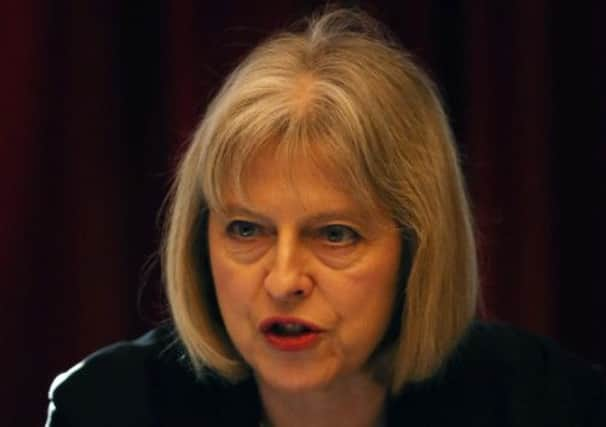BBC’s internet power a threat to democracy - May


Addressing the Society of Editors’ annual conference in London, Theresa May attacked the broadcaster’s ability to subsidise its online coverage with the licence fee. And Mrs May warned that the “might of the BBC” could ultimately impact on “local democracy”.
The Home Secretary said local newspapers were having “a particularly hard time”. She went on: “That’s partly been the result of the BBC’s dominant position on the internet and its ability to subsidise the provision of internet news using the licence fee.
Advertisement
Hide AdAdvertisement
Hide Ad“This makes it enormously difficult for local newspapers to compete. If the BBC can, as they do, provide all the locally significant news, what is left to motivate local people to buy a paper? It’s destroying local newspapers and could eventually happen to national newspapers as well.”
Mrs May said she had held discussions with her local newspaper, the Maidenhead Advertiser, about the impact of the BBC locally and the importance of having an “alternative local news source”. “This is as dangerous for local politics as it is for local journalism,” she said.
“Because, as a local MP, I value the ability to raise issues in my constituency in my local newspaper but also I value its role in disseminating information about what I and local councillors are doing in the area.”
She added. “This is a debate that won’t go away and I believe the BBC has to think carefully about its presence locally and the impact it has on local democracy.” Mrs May said she believed “a plurality of news sources is essential to our democracy”. She warned if newspapers are forced to close down, the country could be left with a single source of information.
The Home Secretary continued: “At a national level, we have a healthy number of competing newspapers in Britain and that’s something we surely don’t want to lose. A monopoly on the provision of information would be a perennial temptation to malpractice, inefficiency and corruption in exactly the same way almost every other kind of monopoly is.
“No single source of news can possibly represent the variety of opinion that there is in this country, and a monopoly news provider would be far too easily captured by special interests.
“So competition in the provision of news is essential to democracy, and diminishing competition is dangerous to the health of democratic politics.
“That’s why it’s important that the internet does not have the effect of making a plurality of newspapers commercially impossible in Britain.”
Advertisement
Hide AdAdvertisement
Hide AdMrs May is the second senior Tory in as many weeks to draw attention to the BBC’s role in the political process after party chairman Grant Shapps accused the corporation of biased reporting and questioned its funding.
Turning to the Royal Charter on press regulation, which was recently sealed by the Queen following a meeting with government ministers in the Privy Council, the Home Secretary said: “I believe wholeheartedly in a free press. I’ve argued today that a free press is vital if we are to confidently claim that we live in a democracy.
“I know practically every journalist has a visceral distrust of any system that could lead innocently or otherwise to what amounted to censoring the press. That’s an understandable anxiety and one that I share.
“But there is cross-party agreement for a Royal Charter and I genuinely believe that most politicians – indeed, the vast majority – have no wish whatsoever to censor the press. Far from it.”
Grade cautions on excessive state influence
Former BBC chairman Lord Grade has hit out at the “bonkers” cross-party Royal Charter system of press regulation, arguing that it is a “dangerous step too far” towards political interference.
He said leading lawyers had questioned the legality of the “carrot and stick” system, where newspapers who sign up to a regulator recognised under the Royal Charter system will be spared the threat of exemplary damages, claiming it could breach human rights laws.
The Tory peer said the process of deciding how to react to the Leveson Report had been “comprehensively hijacked” by pressure group Hacked Off and that, under the system, newspapers would find themselves more at risk of parliamentary interference than the licence-fee funded BBC.
In a speech to the Society of Editors, Lord Grade acknowledged that the press had “brought this situation on itself”, noting: “It certainly does at times seem as if tabloid journalists leave their humanity and their conscience at home when they head for the newsroom. ”
Advertisement
Hide AdAdvertisement
Hide AdBut he added: “The trouble is, that as soon as the politicians became involved, they did what politicians always do: they reached for the statute book – always the wrong answer where press regulation is concerned.”
He added: “We must remember that the public interest is served, yes by newspapers behaving responsibly and ethically and within the law, but also in the end by being free from outside influence, especially that of the state.”